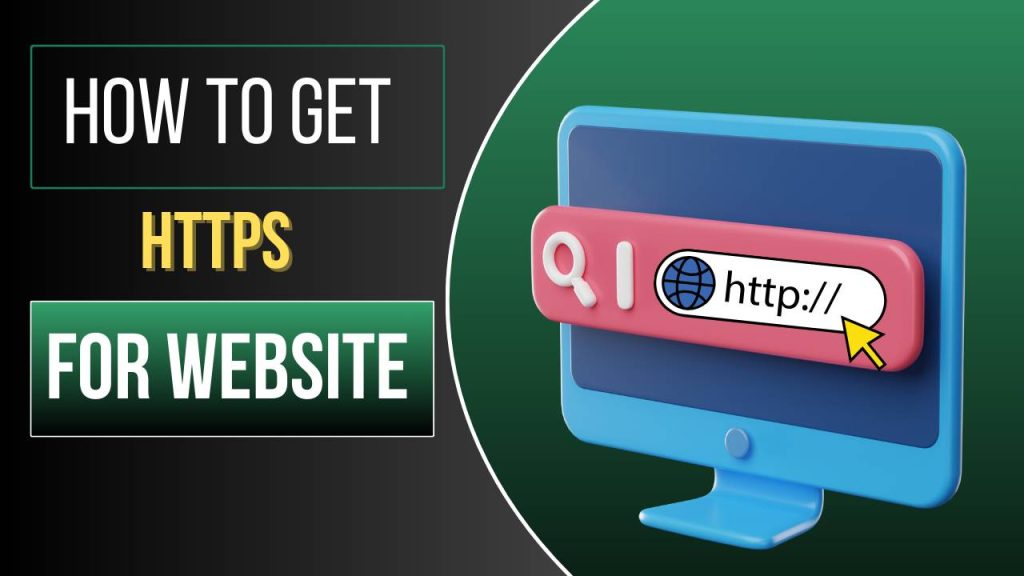Having HTTPS on your website is no longer optional—it’s a fundamental requirement for modern websites. If you’re running a website and still using plain HTTP, it’s time to make the switch immediately. HTTPS not only secures the data exchanged between your server and visitors but also enhances your site’s reputation and credibility.
Beyond just encryption, HTTPS helps protect sensitive information such as passwords, payment details, and personal data from interception or tampering by malicious actors.Modern browsers actively warn users when a site is not secured by HTTPS, which can lead to higher bounce rates and lost visitors.
Here we’ll get to know how to get HTTPS for website using both free and paid SSL certificate options, describe how they function, and help you decide which one fits your needs best.
What is HTTPS and Why Is It Important?
Before we get into the steps on how to get HTTPS for website, it’s essential to understand what HTTPS really means and why it has become a standard. HTTPS stands for HyperText Transfer Protocol Secure, which is an extension of HTTP but with an added layer of security.
It encrypts the data transferred between the user’s browser and the web server, making it extremely difficult for anyone to eavesdrop or alter the information in transit. This encryption is especially vital for websites handling sensitive user data such as login credentials, payment information, or personal identification details.
HTTPS plays a significant role in the digital trust ecosystem. Search engines like Google prioritize HTTPS websites in their ranking algorithms, giving them a notable SEO advantage over non-secure sites. This means that enabling HTTPS can help increase your website’s visibility and organic traffic. Furthermore, HTTPS prevents hackers from injecting malicious content such as ads or malware into your webpages, protecting both your users and your website’s integrity. It also supports compliance with privacy regulations like GDPR, which often require adequate data protection measures on websites.
How Does HTTPS Work?
Understanding how HTTPS works will help clarify why it’s indispensable and how the underlying technology secures your website. HTTPS relies on SSL (Secure Socket Layer) or its modern successor, TLS (Transport Layer Security), protocols that create a secure channel between the user’s browser and your web server. When someone visits an HTTPS site, their browser initiates a process called the SSL handshake to authenticate the server and establish a secure connection.
During the SSL handshake, your server presents its SSL certificate to prove its identity, which the browser then verifies against a trusted certificate authority (CA). Once verified, the browser and server exchange encryption keys used to encode all subsequent data. This encryption ensures that even if a third party intercepts the data, they cannot read or manipulate it. This process happens seamlessly and almost instantaneously, ensuring a smooth user experience without noticeable delays.
It’s also worth noting that modern SSL/TLS certificates use strong cryptographic algorithms to secure communication, which keeps pace with evolving cybersecurity threats. The certificate not only encrypts data but also guarantees that users are communicating with the intended website and not an impostor, which prevents man-in-the-middle attacks.
How to Get HTTPS for Website: Free & Paid Options Explained
Now that you understand why HTTPS is important, let’s break down your options for obtaining it. You can secure your website’s connection with either free SSL certificates or paid SSL certificates, depending on your budget, technical expertise, and trust requirements.
Free SSL certificates have grown popular due to their accessibility and ease of use, providing adequate encryption for most websites. Paid SSL certificates, offer additional layers of validation, warranties, and customer support, which may be essential for business-critical or e-commerce sites handling sensitive transactions.
In the following sections, I will cover the leading free SSL providers and describe different types of paid SSL certificates, including the benefits and limitations of each, so you can make an informed choice based on your specific website needs.
Free SSL Certificates
Free SSL certificates are an excellent choice for individuals and businesses starting out or those running simple websites that don’t require advanced validation. They provide the same level of encryption as paid certificates but without the extra bells and whistles. These certificates are often easy to obtain and can be renewed automatically, minimizing the maintenance overhead.
What is an SSL Certificate? Types, Benefits, and How it Works
Free SSL has dramatically democratized website security, making it accessible to anyone regardless of budget. It’s also an excellent solution for developers and hobbyists experimenting with websites or hosting multiple small projects. Free certificates typically provide only domain validation (DV), meaning they confirm ownership of the domain but do not verify the identity of the website owner or business.
1. Let’s Encrypt (Most Popular Free Option)
Let’s Encrypt is arguably the most widely used free SSL certificate provider worldwide. It’s a nonprofit initiative that has revolutionized website security by automating the issuance and renewal process, enabling millions of websites to enable HTTPS quickly. The certificates offered are Domain Validated (DV) only, which means they verify you control the domain but don’t perform additional checks on your organization.
The biggest advantage of Let’s Encrypt is automation — it integrates with most modern web servers and hosting providers, allowing seamless issuance and automatic renewal every 90 days. This means you don’t have to worry about manually renewing your certificates or risking expiration. Additionally, Let’s Encrypt certificates are trusted by all major browsers and devices, ensuring compatibility for all your visitors.
Because Let’s Encrypt offers only DV certificates, it might not be the best option if you need enhanced validation for e-commerce stores or financial websites where identity assurance is critical. Nonetheless, for most personal blogs, informational sites, and small businesses, Let’s Encrypt provides reliable and trusted encryption at no cost.
2. Cloudflare SSL (Free Plan)
Cloudflare is best known for its Content Delivery Network (CDN) and website performance optimization, but it also provides free SSL certificates to its users as part of its service package. By routing your website traffic through Cloudflare’s network, you gain automatic HTTPS encryption along with performance boosts and protection against DDoS attacks.
Cloudflare’s SSL can be set up in different modes, such as Flexible SSL (which encrypts traffic between the user and Cloudflare but not between Cloudflare and your origin server) or Full SSL (which encrypts the full path). This flexibility is helpful if your server doesn’t support SSL or you want to deploy HTTPS quickly without changing your server’s configuration.
One major benefit of Cloudflare’s free SSL is that it does not require you to install certificates on your server manually. All you need to do is change your domain’s nameservers to Cloudflare and enable SSL in their dashboard. This makes it ideal for beginners and users who want additional security features alongside HTTPS.
3. ZeroSSL (Free DV SSL)
ZeroSSL is another excellent free certificate provider that focuses on ease of use and offers both manual and automated certificate generation. While similar to Let’s Encrypt in functionality, ZeroSSL offers a web-based interface where you can manage your certificates, which some users find more intuitive. It also supports the ACME protocol, allowing automation of certificate issuance and renewal.
With ZeroSSL, you get 90-day free certificates that are renewable, similar to Let’s Encrypt. They also provide some paid plans if you need longer certificate validity or priority support. ZeroSSL’s dashboard and APIs make it attractive for those managing multiple websites or requiring greater control over their certificate management.
For businesses or developers looking for a simple free solution with a polished interface and added control, ZeroSSL is a worthy alternative.
Some of Paid SSL Certificates
Paid SSL certificates offer enhanced security features and business validation options that free certificates cannot provide. While encryption strength is similar across free and paid SSL, paid certificates add trust indicators such as company name display and warranties against mis-issuance or breach. This makes them highly desirable for websites that need to establish brand credibility or handle financial transactions.
Paid SSL certificates come with professional customer support, extended validity periods (usually one to two years), and often additional tools like malware scanning, vulnerability assessments, and stronger warranties. These features can be essential for businesses operating in regulated industries or those requiring strict compliance with security standards such as PCI-DSS.
1. Domain Validated (DV) SSL Certificates
Paid DV SSL certificates are very similar to free ones in that they validate only domain ownership. Paid DV certificates come with support and warranties that can protect you financially in the unlikely event of certificate failure or fraud. These certificates are quick to issue and typically cost less than $30 per year.
They are suitable for small businesses or personal sites that want to add a level of assurance and support beyond free SSL options but don’t require organization verification. Some reputable brands providing DV certificates include GoDaddy, Namecheap, and DigiCert, which also offer easy installation guides and customer service.
2. Organization Validated (OV) SSL Certificates
Organization Validated certificates provide a higher level of trust because the certificate authority verifies the legitimacy of your business or organization along with domain ownership. This process involves submitting official business documents, and the vetting can take a few days.
OV certificates display the verified organization name in the certificate details, which helps build user confidence. They are highly recommended for companies handling customer data, subscription services, or business communications, as they offer a middle ground between basic domain validation and the highest extended validation.
3. Extended Validation (EV) SSL Certificates
EV SSL certificates provide the highest level of validation, requiring a rigorous identity verification process. Historically, browsers would highlight the organization’s verified name prominently in the address bar (green bar), although recent browser changes have reduced this visible indicator. Still, EV certificates offer the most robust assurance and are backed by substantial warranties.
These certificates are ideal for banks, financial institutions, and large e-commerce sites that require users to feel extremely confident before entering sensitive data. They also play a critical role in regulatory compliance and fraud prevention.
4. Wildcard SSL Certificates
Wildcard certificates allow you to secure not only your main domain but also an unlimited number of subdomains with a single certificate. This is highly convenient for businesses running multiple subdomains like blog.yoursite.com, shop.yoursite.com, or support.yoursite.com.
Purchasing a wildcard SSL certificate reduces administrative overhead because you don’t need to manage separate certificates for each subdomain. They are available with domain validation or higher validation levels, depending on your needs, and are ideal for growing businesses with diverse online properties.
5. Multi-Domain SSL Certificates (SAN/UCC)
Multi-domain SSL certificates, also known as SAN (Subject Alternative Name) or UCC (Unified Communications Certificate), enable you to secure multiple different domain names or hostnames under one certificate. This simplifies management for companies owning multiple brands or websites.
These certificates offer flexibility and cost savings compared to buying individual certificates for each domain. They are often used by enterprises or agencies managing a portfolio of sites and can include domains across different extensions (e.g., .com, .net, .org).
How to Install HTTPS on Your Website (Step-by-Step)
After choosing the right SSL certificate, the next step is installation. This can vary depending on your hosting provider, server type, and certificate issuer.
1. Purchase or Generate SSL Certificate
For paid SSL certificates, you start by purchasing the certificate and generating a Certificate Signing Request (CSR) through your web server’s control panel or terminal. The CSR contains encoded information about your domain and organization and is submitted to the certificate authority for validation.
For free SSL certificates like Let’s Encrypt, many hosting providers offer automated tools that handle this step for you, eliminating the need for manual CSR creation.
2. Verify Domain Ownership
Verification can be done in several ways depending on the certificate type and issuer:
- Email verification: A confirmation email is sent to a domain-registered email.
- DNS verification: Adding a specific DNS TXT record to your domain’s DNS settings.
- File-based verification: Uploading a special file to your website’s root directory.
Automated tools, such as Let’s Encrypt’s ACME protocol, streamline this process, making it easy and quick.
3. Install the Certificate on Your Server
Once validated, the certificate files need to be installed on your web server. Most hosting providers have built-in options in control panels like cPanel, Plesk, or DirectAdmin, allowing a few clicks to install SSL.
If you’re using VPS or dedicated servers, installation is done via command-line by configuring your web server (Apache, NGINX) with the certificate and private key files. For Cloudflare users, no server installation is necessary as the SSL operates at the edge.
4. Update Your Website Configuration
To ensure full HTTPS adoption:
- Update your site’s internal links and resources (images, scripts, stylesheets) to use HTTPS URLs.
- Implement a redirect from HTTP to HTTPS using
.htaccess(Apache) or server config files to prevent duplicate content issues and ensure all visitors use the secure version. - Update your Content Delivery Network (CDN) settings if applicable.
- Modify sitemap and canonical URLs to reflect HTTPS.
5. Check for HTTPS Errors and Renewals
After installation, test your site using SSL analysis tools like SSL Labs or browser developer tools to detect any certificate issues or mixed content warnings. Mixed content occurs when some resources are still loaded over HTTP, which can cause security warnings.
Monitor your certificate’s expiration dates to avoid downtime or security warnings. Free certificates require renewal every 90 days but can be automated. Paid certificates typically last 1-2 years, and many providers offer renewal reminders.
Free vs Paid SSL: Which One Should You Choose?
Understanding the differences between free and paid SSL certificates will help you make the right decision for your website security and business needs.
| Feature | Free SSL (Let’s Encrypt, ZeroSSL) | Paid SSL (DV/OV/EV) |
|---|---|---|
| Encryption Strength | Industry standard, very strong | Industry standard, very strong |
| Validation Type | Domain validation only | Domain, Organization, Extended Validation available |
| Customer Support | Community support only | Dedicated 24/7 support |
| Warranty | None | Warranty protection against breaches and fraud |
| Certificate Duration | 90 days (renewable) | 1 to 2 years |
| Trust Indicators | Padlock only | Padlock + Organization name (OV/EV) |
| Ease of Use | Automated with hosting integration | Requires manual installation for some |
| Price | Free | $10 to $500+ per year |
Free SSL is ideal for blogs, informational websites, and startups needing quick and easy HTTPS. Paid SSL is recommended for businesses, e-commerce, and sites that need to build extra user trust and comply with regulations.
AI Bot Traffic Is Hijacking Your Site: Here’s How to Stop It Now
Whichever route you choose, ensure timely installation, regular renewal, and proper configuration to enjoy a safer, SEO-friendly website experience. If you need assistance with SSL installation or want to know advanced options like wildcard or multi-domain SSL certificates, consider consulting your hosting provider or a cybersecurity expert.
FAQs
1. What is HTTPS and why do I need it for my website?
HTTPS (HyperText Transfer Protocol Secure) encrypts the data between your website and visitors, ensuring privacy and security. It protects sensitive info like passwords, payments, and personal data, boosting user trust and improving SEO rankings.
2. How do I get HTTPS for my website for free?
You can get HTTPS for free by using SSL certificates from providers like Let’s Encrypt. Many hosting providers offer easy integration for free SSL, automating the certificate issuance and renewal process, making it simple even for beginners.
3. What are the differences between free and paid SSL certificates?
Free SSL certificates usually cover basic encryption and are valid for 90 days with automatic renewal. Paid SSL offers extended validation, warranty protection, and higher trust levels with organization details displayed, ideal for e-commerce and business sites.
4. How do I install an SSL certificate on my website?
Installation varies by hosting service but generally involves generating a Certificate Signing Request (CSR), submitting it to your SSL provider, then uploading the issued certificate via your hosting control panel or server. Many hosts automate this for free SSLs.
5. Can I get HTTPS for my website without technical knowledge?
Yes. Many hosting companies provide one-click SSL activation or automatic Let’s Encrypt integration, enabling HTTPS without deep technical skills. Otherwise, some basic steps or guidance may be needed for manual installation.
6. How long does it take to get HTTPS for a website?
Getting HTTPS can be almost instant with free SSL certificates through automated services, usually completed within minutes to a few hours. Paid certificates may take longer due to validation procedures but typically are issued within 1-3 days.
7. Is HTTPS necessary for all websites?
Yes, HTTPS is recommended for all websites regardless of content type. Search engines favor HTTPS sites for rankings, and browsers warn users about non-secure pages. Even blogs or informational sites benefit from HTTPS.
8. How often do I need to renew my SSL certificate?
Free SSL certificates generally last 90 days and must be renewed regularly, often automatically via hosting integration. Paid SSL certificates last 1 to 2 years and require manual or automated renewal before expiration.
9. What happens if my SSL certificate expires?
When an SSL certificate expires, browsers show security warnings to visitors, discouraging them from accessing your site. This can lead to lost traffic, reduced trust, and negatively impact your website’s reputation and SEO.
10. Can I switch from a free SSL certificate to a paid one later?
Absolutely. You can start with a free SSL certificate and upgrade to a paid one anytime. Paid certificates provide extra validation and trust, especially important as your website grows or handles sensitive transactions.




